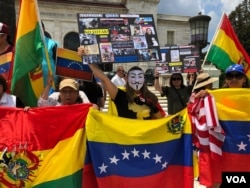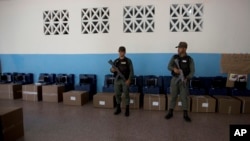Voter turnout in Venezuela for the country's presidential election was sparse by mid-morning on Sunday, as incumbent Nicolas Maduro was widely expected to win a second-six year term.
Sunday's election is being boycotted by the opposition as the “coronation” of a dictator and condemned by much of the international community.
Venezuelans expats protesting what the see as an unfree election in their homeland were joined by Nicaraguans and Bolivians, among others, in the U.S. capital Washington, D.C., Sunday.
Maduro, 55, a former bus driver, is expected to win despite a deepening crisis that has made food scarce and inflation soar as oil production plummets in one of the world’s once top producers.
Former state governor Henri Falcon is Maduro’s main challenger, but his chances are hurt by the presence of a second anti-Maduro candidate in the race, evangelical pastor Javier Bertucci.
A Maduro victory could trigger more sanctions, including oil sanctions from the U.S. government, and more censure from the European Union and Latin America.
U.S. State Department spokesperson Heather Nauert said Venezuela's "so-called elections today are not legitimate." "The United States stands with democratic nations around the world in support of the Venezuelan people and their sovereign right to elect their representatives through free and fair elections," she said on Twitter.
The self-described son of Hugo Chavez, Maduro said Saturday that he is battling a U.S. “imperialist” plot to crush socialism and take over the OPEC nation’s oil wealth.
On Friday, the Trump administration added a key Maduro ally to a growing list of top officials targeted by financial sanctions, accusing socialist party boss Diosdado Cabello of drug trafficking and embezzlement.
Maduro’s opponents say the leftist leader has destroyed Venezuela’s once-wealthy economy and ruthlessly crushed dissent. Polls also show Venezuelans overwhelmingly blame Maduro for their mounting troubles.
More than 1 million Venezuelans have left their country in recent years for a better life abroad, while those staying behind wait in line for hours to buy subsidized food and withdraw cash that is almost impossible to find.







